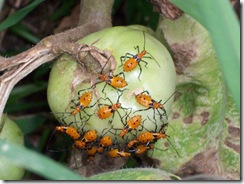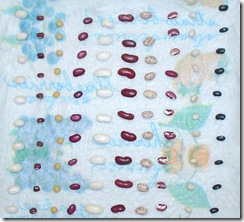 | Stink bugs |
 | Fusarium Wilt |
 | Caterpillars |
 | Spider Mites |
Tuesday, August 19, 2008
Monday, August 18, 2008
Whole Foods' beans for seeds
I heard recently of using beans from the grocery store as garden seeds, with Whole Foods suggested as a good source for clean, well-handled legumes. Whole Foods wouldn't sell GMO beans and offers several organically-grown varieties.
To test the beans, I ran a seat-of-my-pants germination trial. I took 10 seeds of ten varieties: Pintos, Adzuki, Anasazi, Red Kidney, Cannelini, Red Beans, Navy Beans, Soy Beans, Black Beans and Baby Lima Beans. Of the ten, all but the Back, Red and Red Kidney Beans are labeled "organic". For the trial, I used distilled water, with the seeds placed between layers of paper towel.
Saturday, August 2, 2008
The Russian Kitchen Garden ... in Houston
In his book entitled Reinventing Collapse, Dimitry Orlov tell us how Russian households fed themselves through the difficult times of the Soviet century by cultivating small 'kitchen gardens'. Averaging 1000 square feet, the kitchen garden was remarkably productive, much more so than the failed collective farms of the era. Russian gardeners proved that society can weather enormous hardship so long as its families can feed themselves.  Projecting the Russian system on a city like Houston is enlightening. It works like this: the 2000 census listed 717,945 households in Houston, which would require 717,945,000 square feet, or 16,475 acres of land to give each household a garden. The land needed would amount to only 5% of Houston's 383,838 acres--but converting the green areas of Houston would still be a gargantuan task. The task would represent the physical equivalent to the Victory Garden effort of the forties. Doable, but I am skeptical that we can pull it off. Success would require that we reinvigorate social and spiritual muscles that have gone flaccid after decades of disuse.
Projecting the Russian system on a city like Houston is enlightening. It works like this: the 2000 census listed 717,945 households in Houston, which would require 717,945,000 square feet, or 16,475 acres of land to give each household a garden. The land needed would amount to only 5% of Houston's 383,838 acres--but converting the green areas of Houston would still be a gargantuan task. The task would represent the physical equivalent to the Victory Garden effort of the forties. Doable, but I am skeptical that we can pull it off. Success would require that we reinvigorate social and spiritual muscles that have gone flaccid after decades of disuse.
The gap in Houston is more of a culture gap than a land gap. At one end of the spectrum are apartment dwellers with little access to open land. At the other end are massive houses sitting on 1/4 acre lots; not well situated for homesteading. Houston's neighborhoods are vast and complex. Cultural diversity has been in driving growth in Houston, which adds to the complexity. During times of expanding economic opportunity, people feel well-disposed to neighbors who are different than they are. When the economy gets bumpy, the same people grow distrustful. I'm skeptical, but we're running out of time supporting the unsustainable habits of 717,945 households.
Added to the cultural gap is the lack of simple training in this country. Productive gardens the result of know-how more than they require land, seeds and fertilizer. The knowledge gap for Americans today is wide. In Houston, if only one person out of ten households received training, 72,000 would need to be trained. A daunting task, but a realistic start to reaching a goal. Here again, this city doesn't have the moral will to divert its attentions to gardening and away from all of the other attractions of modern life.
Why make the effort?
There is a big payoff. A concerted household garden movement would strike at the heart of multiple monsters that threaten American society. On a smaller scale, most families are pressed to make changes to their household food economy. Here's how the kitchen garden would benefit households:
1. Inflation- Food costs are the fastest expanding segment of consumer prices. Grow 50% of your family's food and you "deflate" a large portion of your expenses.
2. World Hunger- Food consumed in the U.S. is food that is not available to the world's hungry. Half of an American families' food will support more than a single family in Africa. It's a crazy calculus- but we consume so much food that shifting to half of our demand to the family garden makes a significant impact on the world. It's not just helping the less fortunate "over there", we'll also be helping ourselves. If the world food crisis is not addressed soon, we'll watch increasing numbers of the urban poor of Mexico spill over the border of "el Norte", driven by hunger.
3. Save Energy- Food production in the U.S. is colossally inefficient. Growing tomatoes 20 feet from the kitchen table is an energy miracle. Hey--it's how God intended it.
4. Stick it to "the Man"- Tired of standing in line at the grocery store? Here's your chance to reclaim half of that wasted time.
5. It's Healthy, it's Tasty- This one requires no explanation.
You'll also enjoy the time in the sun, strolling through the plants. Maybe sing a little. Remember, it is the first and most enduring occupation. In a post-petroleum world, we'll all garden--so why not get our hands dirty now?





